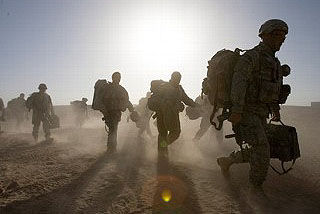 The Washington Post has obtained a copy of Gen. Stanley McChrystal’s report on the war in Afghanistan:
The Washington Post has obtained a copy of Gen. Stanley McChrystal’s report on the war in Afghanistan:
The assessment offers an unsparing critique of the failings of the Afghan government, contending that official corruption is as much of a threat as the insurgency to the mission of the International Security Assistance Force, or ISAF, as the U.S.-led NATO coalition is widely known.
“The weakness of state institutions, malign actions of power-brokers, widespread corruption and abuse of power by various officials, and ISAF’s own errors, have given Afghans little reason to support their government,” McChrystal says.
The result has been a “crisis of confidence among Afghans,” he writes. “Further, a perception that our resolve is uncertain makes Afghans reluctant to align with us against the insurgents.”
McChrystal is equally critical of the command he has led since June 15. The key weakness of ISAF, he says, is that it is not aggressively defending the Afghan population. “Pre-occupied with protection of our own forces, we have operated in a manner that distances us — physically and psychologically — from the people we seek to protect. . . . The insurgents cannot defeat us militarily; but we can defeat ourselves.”
A separate report outlines McChrystal’s request for more troops, without which the war “will likely result in failure,” he says. But I gotta ask: considering the unrelentingly grim assessment in the rest of his report, is it really likely that a few more troops and a change in emphasis toward COIN and away from counterterrorism will bear results within 12 months? Because that’s what McChrystal says the timeframe is.
That hardly seems likely to me. But then, the surge in Iraq seemed an unlikely strategy to me too, and yet it worked1. So my track record in surge-ology isn’t great. Still, it’s worth bearing a couple of things in mind. First, the Iraqi surge succeeded only because it was accompanied by several other developments (primarily the Sunni awakening, two previous years of sectarian cleansing, and al-Sadr’s ceasefire), none of which can or will be duplicated in Afghanistan. Second, the Iraqi surge was fundamentally targeted at Baghdad. Spreading 28,000 troops throughout a country where we already had 140,000 in place would almost certainly have had no effect. But most of the troops were deployed in Baghdad, where it meant a near doubling of capacity, and that did have an effect. Baghdad was so central to the rest of Iraq that a reduction of violence there had a country-wide effect.
But no such concentration is possible in Afghanistan. Kabul isn’t as important to Afghanistan as Baghdad is to Iraq, and in any case Kabul is already relatively safe. It’s the rest of the country that needs more troops, and it’s hard to think of any single place they could be concentrated enough to have a real impact.
I think that’s the key thing to look for when McChrystal gets more specific: what, exactly, does he propose to do with the additional troops? If the idea is to spread them out in some way (for troop training, insurgent fighting, population protection, etc.), his request should probably be viewed skeptically. But if he can propose some key operation or area where additional troops would represent a doubling or tripling of capacity and success might have an outsize effect on the entire conflict, then it might be worth trying. We’ll see.
1I know, I know: “worked” is a question begging term. But the surge did reduce violence, increase security, and make political reconciliation at least a possibility. Long term stability is still up in the air, but even the short-term success of the surge was more than I thought likely at the time.

















